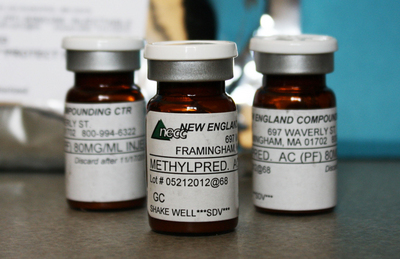Meningitis update: Four new cases confirmed at St. Joseph Mercy Ann Arbor hospital
Four new cases of fungal meningitis have been confirmed at St. Joseph Mercy Ann Arbor, hospital officials announced Wednesday morning, bringing the total of cases being treated at the facility to 21.
A patient who was transferred from St. Joseph Mercy Ann Arbor to hospice care prior to the knowledge of the fungal meningitis outbreak died from the illness, the hospital announced Tuesday.
Related articles
- Husband of woman who died in meningitis outbreak calls for better drug inspections
- Meningitis update: Latest Michigan death is 78-year-old Washtenaw County woman
- 19 of 21 meningitis cases in state being treated at Ann Arbor hospitals
- Man whose wife died of fungal meningitis: 'I've lost my best friend'
- 1 of 2 Michigan meningitis deaths occurred at University of Michigan Hospital
- 2 Michigan deaths linked to growing fungal meningitis outbreak, officials say
- St. Joseph Mercy hospital treating 6 meningitis cases linked to contaminated steroid
Hospital officials said they could not say if the patient who died was a 78-year-old Washtenaw County woman that the Michigan Department of Community Health confirmed as the third death in the state Tuesday afternoon.
Meanwhile, several media outlets reported Wednesday that the death toll nationwide from the fungal meningitis outbreak has risen to 12, and the number of confirmed cases of the illness has climbed to 121 after Florida officials updated their case count late Tuesday. The latest update from the Centers for Disease Control Tuesday had put the number of cases at 118 with 11 deaths.
One of the deaths occurred at the end of September at the University of Michigan Health System, officials have said. U-M is currently treating one of the Michigan cases.
The state health department is expected to update its statewide case count at 3 p.m. Wednesday, about an hour after the Centers for Disease Control and Prevention updates its nationwide count.
The CDC is working closely with state health departments across the country to help identify patients that may have come into contact with a batch of steroids tainted with fungus that were manufactured at the New England Compounding Center in Framingham, Mass.

Vials of the injectable steroid product made by New England Compounding Center implicated in a fungal meningitis outbreak. About 17,700 single-dose vials of the steroid sent to 23 states have been recalled.
The Associated Press
Meningitis is the inflammation of the tissues surrounding the brain and spinal cord. Fungal meningitis is considered to be rare and is not contagious like other forms of meningitis.
In Michigan, four facilities received shipments of the contaminated steroid, including Michigan Pain Specialists in Brighton.
Michigan Pain Specialists said Tuesday that it treated about 875 patients between Aug. 7 and Oct. 2 with lots of the contaminated steroids.
Two of the three Michigan patients who died were treated at the facility, according to a statement.
Some physicians that work at St. Joseph Mercy Ann Arbor also privately practice at the Brighton facility, hospital officials said.
Any steroid injections for pain the physicians may have given happened at Michigan Pain Specialists in Brighton, hospital officials said.
The facility is instructing its patients who were treated with injections between those dates to go to the emergency room at St. Joseph Mercy Hospital in Superior Township if they are experiencing any of the following symptoms: Fever, new or worsening headache, sensitivity to light, increasing pain, redness or swelling at the injection site and stiffness of the neck.
“We are working closely with the CDC, the Michigan Department of Community Health and St. Joseph Mercy Hospital to ensure every patient who may have been exposed gets the information and treatment they need,” according to a statement from Michigan Pain Specialists. “All injections were administered in a sterile environment under strict protocols. We had no reason to believe the medication we administered was tainted.”
Amy Biolchini covers Washtenaw County, health and environmental issues for AnnArbor.com. Reach her at (734) 623-2552, amybiolchini@annarbor.com or on Twitter.


Comments
dotdash
Wed, Oct 10, 2012 : 8:11 p.m.
Why did none of the large hospitals around here use the contaminated material (all the victims were injected at smaller commercial establishments)? Were their standards higher than to buy from NE Compounding? They compound their own? Just luck?